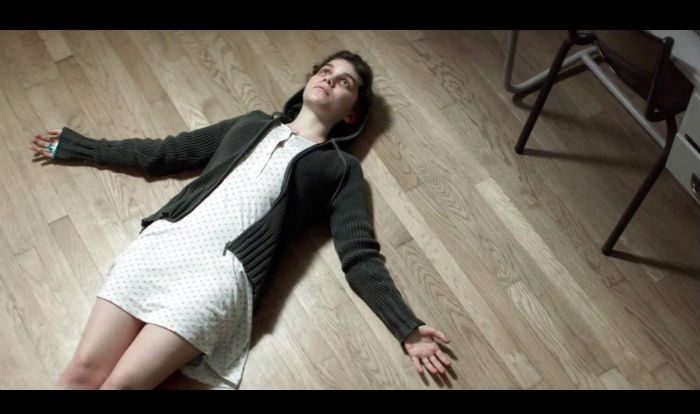Is “The Apparition” a good movie? It has its flaws, but as a piece about the mystical heart of Catholicism, it’s a rare and surprising success.
Written and directed by Xavier Giannoli, it focuses on a long-ago lapsed Catholic journalist (Vincent Lindon) recovering from the physical and psychological aftereffects of his photog partner’s violent death in the Middle East. He’s called in to help investigate reports of a Marian apparition in a French village, reported by a young novice, Anna (a revelatory Galatéa Bellugi).
What he finds are people (Catholic clergy included) honestly seeking the truth; people looking to exploit the situation (but not necessarily with evil intent); people willing, even desperate, to believe; and a young woman whose evident personal holiness makes it difficult to disbelieve her, even if some details also make it difficult to believe her.
He digs into the tangle of her foster-home background, to discover, as one character tells him, that the truth may not be what he expects.
Now, if only “The Apparition” was a half-hour shorter, it wasn’t quite so arty (Why, oh, why, do people in “arthouse” movies talk in cryptic half-sentences and stare wordlessly at each other?), and if the French leading man had more facial expressions than hangdog and painful hangdog.
But, this is French cinema (the movie is mostly in French, with subtitles), so there’s probably a lot about it I don’t get. But these, I did get: the film respects Catholicism and Catholics; no one is caricatured or stereotyped; and the conclusion was at once odd and oddly satisfying.
Not long ago, I read a book called “The Miracle Detective,” the true-life account of journalist Randall Sullivan. Unsure in his own faith, he investigates Marian apparitions, including Medjugorje (about which I remain profoundly ambiguous, so don’t even ask). Few he meets, from the seers to the locals to the religious tourists, are what he expects — or even what they appear on the surface.
There are so many moving parts in these apparition reports, far beyond just the seers (who sometimes seem like mere conduits, and other times, as if they’re bearing messages from inside themselves as well … or both) that grasping them fully seems futile. It was for Sullivan, but nevertheless, it led him back to the Church … which surprised no one as much as him.
Marian apparitions are strange. Everything touching the divine or the supernatural is strange. God is strange, and His ways are not our ways. If, how and when Mary, or angels or anyone else from heaven, appears to people is at the bidding of an inscrutable force that we can only dimly understand.
I tend to think that if a Marian apparition makes immediate sense, if it seems to serve obvious human purposes, if it has a logic to it that’s easily understood, then it’s probably a delusion or a fraud.
“The Apparition” does best when it’s diving headlong into the slippery strangeness of it all. A miracle may wind up surrounded by hucksters and fakes, but that doesn’t mean the miracle is fake. Nevertheless, the Church is very circumspect about approving of apparitions and miracles, and it’s right to be that way. But even a misunderstood miracle can have a huge, even positive, impact.
Many years ago, when TV writer/producer David Milch was tutoring me a bit on screenwriting, he derided stories that just seemed like one event after another, with the effects of each remaining unexamined — like throwing rock after rock into water and ignoring the ripples.
The story, he said, is not the rock, it’s the ripples. The story is not what happens, but what happens because of what happens. “The Apparition” lives in the ripples, as it’s less worried about the vision itself than how it affects the lives of everyone it touches. And that’s a good thing.
Now, for another perspective, I’ll yield the floor to Father Vince Kuna, C.S.C., one of my co-workers and a graduate of USC Film School (who probably understands French cinema better than me):
For those seeking a Hollywood-style, SONG OF BERNADETTE interpretation of a Marian vision, viewers to THE APPARITION might be disappointed. You won’t find a visual-effect Mary that once greeted Jennifer Jones’s Bernadette Soubirous. This modern French film, typical of the European style, favors an objective, stark approach towards novice Anna (Galatea Bellugi) claiming the vision. Since the Church does not obligate a Catholic’s belief for recorded visions (even ones validated), I appreciated this latter approach towards this category of the supernatural. The film itself leaves the Church ruling on the vision ambiguous. Church authorities won’t prevent pilgrims from visiting the site, but they also stop sort of granting a full, candle-waxed sealed of approval. Such matters, I suppose take a leap of faith on the part each believer, when forensic evidence ultimately and inevitably falls short.
“The Apparition” opened Sept. 7 in New York, Los Angeles, Chicago, Philadelphia, Washington D.C. and San Francisco, then subsequently moves on to other parts of the country. The Fandango link is here; more information, from distributor Music Box Films, can be found here.
Image: Courtesy Music Box Films















